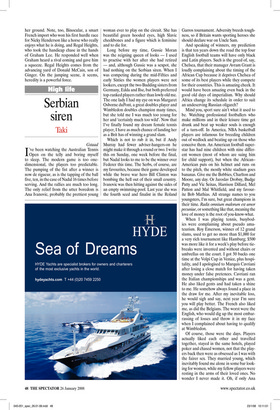Serbian siren
Taki
Gstaad I’ve been watching the Australian Tennis Open on the telly and boring myself to sleep. The modern game is too onedimensional, the players too predictable. The pumping of the fist after a winner is now de rigueur, as is the tapping of the ball five, ten, in the case of Nadal 16 times before serving. And the rallies are much too long.
The only relief from the utter boredom is
HY Spec 122x125Nayut 1 2 Ana Ivanovic, probably the prettiest young
woman ever to play on the circuit. She has beautiful green hooded eyes, high Slavic cheekbones and a figure which is feminine and to die for.
Long before my time, Gussie Moran was the reigning queen of looks — I used to practise with her after she had retired — and, although Gussie was a sexpot, she had nothing on the Serbian siren. When I was competing during the mid-Fifties and early Sixties the women players were not lookers, except the two Budding sisters from Germany, Edda and Ilse, but both preferred top-ranked players rather than lowly old me. The one lady I had my eye on was Margaret Osborne duPont, a great doubles player and Wimbledon doubles champion many times, but she told me I was much too young for her and ‘certainly much too wild’. Now that I’ve finally found my dream female tennis player, I have as much chance of landing her as a Brit has of winning a grand slam.
Which is not to rub it in, but if Andy Murray had fewer adviser-hangers-on he might make it through a round or two. I write this on Sunday, one week before the final, but Nadal looks to me to be the winner over Federer this time. The Serbs, of course, are my favourites, because their game developed while the brave war hero Bill Clinton was bombing the hell out of their small country. Ivanovic was then hitting against the sides of an empty swimming-pool. Last year she was /11/07 1216 Page 1 the fourth seed and finalist in the Roland Garros tournament. Adversity breeds toughness, so if Britain wants sporting heroes she should declare war on Uncle Sam.
And speaking of winners, my prediction is that ten years down the road the top four English football teams will have only black and Latin players. Such is the greed of, say, Chelsea, that their manager Avram Grant is loudly complaining about the timing of the African Cup because it deprives Chelsea of some of its best players while they compete for their countries. This is amazing cheek. It would have been amazing even back in the good old days of imperialism. Why should Africa change its schedule in order to suit an undeserving Russian oligarch?
Mind you, sport sure ain’t what it used to be. Watching professional footballers who make millions and in their leisure time get drunk and beat up weaker souls is enough of a turn-off. In America, NBA basketball players are infamous for breeding children out of wedlock and beating up on those who conceive them. An American football superstar has had nine children with nine different women (most of whom are suing him for child support), but when the African– American puts on his helmet and runs on to the pitch, the mostly white stadium goes bananas. Give me the Bobbies, Charlton and Moore, any day. Or Jaroslav Drobny, Budge Patty and Vic Seixas, Harrison Dillard, Mel Patton and Mal Whitfield, and my favourite Bob Mathias. All strange names to you youngsters, I’m sure, but great champions in their time. Radix omnium malorum est amor pecuniae, or something like that, meaning the love of money is the root of you-know-what.
When I was playing tennis, busybodies were complaining about pseudo amateurism. Roy Emerson, winner of 12 grand slams, used to get no more than $1,000 for a very rich tournament like Hamburg; $500 was more like it for a week’s play before tiebreaks were invented and without chairs or umbrellas on the court. I got 50 bucks one time at the Volpi Cup in Venice, plus hospitality, and I apologised to Marquis Cavriani after losing a close match for having taken money under false pretences. Cavriani ran the Italian championships and was a gent. He also liked gents and had taken a shine to me. He somehow always found a place in the draw for me. After my inevitable loss, he would sigh and say, next year I’m sure you will play better. The French also liked me, as did the Belgians. The worst were the English, who would dig up the most embarrassing of losses and throw it in my face when I complained about having to qualify at Wimbledon.
Of course, those were the days. Players actually liked each other and travelled together, stayed in the same hotels, played poker and chased women, not that the players back then were as obsessed as I was with the fairer sex. They married young, which inevitably found me alone in some bar looking for women, while my fellow players were resting in the arms of their loved ones. No wonder I never made it. Oh, if only Ana had been born 50 years earlier, I would be travelling with her to Baden-Baden, Venice, Rome, Paris, even London, going to bed immediately after practice and being oh so happy and content. Perhaps in the next life.











































































 Previous page
Previous page